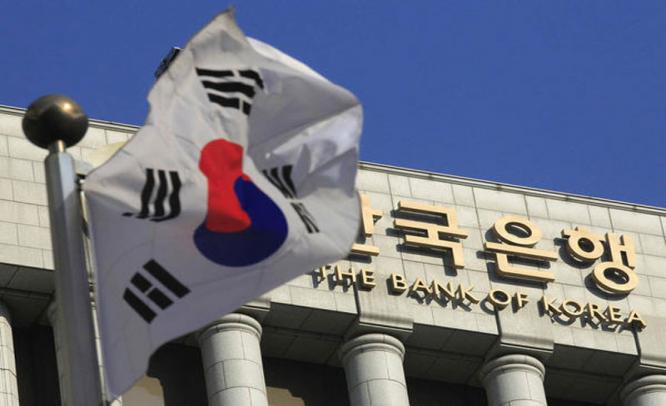The central bank has kept the base rate untouched for months, but an uptrend in the inflation rate and slight slippage in export performance may call for some policy changes, reports Team IFM
Seoul, June 18: South Korea’s central bank held its benchmark interest rate steady at 2.5 percent for a 13th straight month, but flagged some signs of slippages in sustained economic recovery while analysts see the bank raising rates as early as next quarter on expectations of rising inflation.
Bank of Korea (BOK) Governor Lee Ju-yeol on June 12 told reporters that recovery in domestic demand had “paused” due partly to the April ferry disaster that killed more than 300 people.
But Lee, who returned in April to head the bank where he had served for 35 years until 2012, gave an upbeat view on economic growth and inflation.
“If the softened domestic consumption picks up, as we hope and expect, the economy will go on the path that we have forecast. We are looking very closely as to whether this sluggishness in spending will be long-term… Our biggest interest is at what pace this weakened sentiment will recover,” The Gulf Today used a Reuters report quoting him as saying.
The bank’s decision to hold the benchmark rate comes ahead of a possible move by the US Federal Reserve to taper economic stimulus. All eyes are on a Fed policy meeting next week that could decide to start cutting its $85 billion monthly bond purchases.
Incidentally, widespread cancellation of tickets for domestic travel prompted the finance ministry to admit that the tourism industry was hit hard following the sinking of the ferry M.V. Sewol on April 16.
Consumer and business sentiment indicators slumped immediately after the incident, although finance ministry data showing retail sales rebounded in May assuaged some concerns over a sharp downturn in domestic consumption.
EXPORTS SCENARIO
Exports unexpectedly fell 0.9 percent in May from a year earlier, the biggest drop since September. The decline was partly due to fewer working days than in last year, Bloomberg said quoting a government statement.
But, month-on-month, exports have shown some buoyancy while the recovery was slightly slowed down by sluggish domestic consumption, according to the BOK statement.
In April, the central bank had forecast that the economy would grow 4 percent this year and 4.2 percent next, the fastest since 2010. Similarly, inflation (South Korea’s CPI y-o-y), which rose to a 19-month high in May, will accelerate to 2.7 percent in the second half of this year, within the BOK’s target range of 2.5 percent to 3.5 percent, according to the April projections.
Most economists predict that the central bank will raise the rate, with the median forecast of 21 economists surveyed by Bloomberg pointing to a bump to 2.75 percent by the first quarter of next year.
Bloomberg quotes HSBC Holdings Plc as forecasting a 25 basis point rate increase in the third quarter of this year as inflation continues to show an uptrend and the economy stays on track to close the output gap by year-end.
Bond futures rose as the central bank chief’s cautious view on domestic demand in Asia’s fourth-largest economy prompted investors to scale back bets for the Bank of Korea starting to raising interest rates over the next few months.
Analysts told Reuters that Lee was not seen as having abandoned his position that the next policy change would be a rise in the 7-day repurchase agreement rate, an interest rate on money lent out by the central bank.
“Although it remains to be seen, there are many pieces of evidence that the economy is headed down,” Reuters quoted Kong Dong-rak, a fixed-income analyst at Hanwha Securities, as saying. “The Bank of Korea news conference was in reality the governor taking a few steps back from his previous evaluation of the economy.”
WON APPRECIATES
The won has gained about 12 percent against the US dollar over the past year, clouding the outlook for the nation’s exports. BOK chief Lee had said last month that the stronger currency and sentiment hit by a deadly ferry disaster on April 16 may increase hardship for businesses, while Finance Minister Hyun Oh-seok urged companies to expand hiring and investment to boost growth.
“The BOK will likely conclude the economy may lose some steam but the interest rate is accommodative enough for now,” Bloomberg quoted Lee Jung Joon, a fixed-income analyst at HMC Investment Securities in Seoul, as saying. “Governor Lee will raise the rate in September or later in the year as inflation is creeping up.”
The central bank will take measures if volatility in the currency market increases, Ryoo Sang Dai, a BOK official, told Bloomberg News.
The BOK expects growth in Asia’s fourth-largest economy to reach the 4-percent mark this year from 3 percent last year and inflation to quicken to 2.1 percent from 1.3 percent in 2013.
Governor Lee will release BOK’s latest economic forecasts for this year and 2015 in July. The central bank may slightly lower its latest growth forecast of 4 percent set for 2014 as the recovery in both domestic demand and exports is seen to have slowed.
The benchmark interest rate in South Korea was last recorded at 2.5 percent. Interest rate in South Korea averaged 3.69 percent from 1999 until 2014, reaching an all-time high of 5.25 percent in October of 2000 and a record low of 2 percent in February of 2009.
In South Korea the interest rates decisions are taken by the BOK’s Monetary Policy Committee. The official interest rate is the BOK base rate which was changed from overnight call rate on March 2008.

